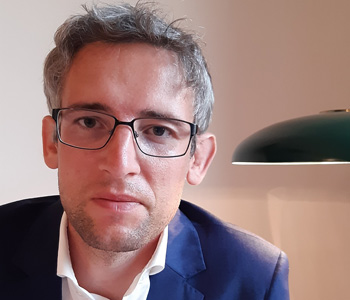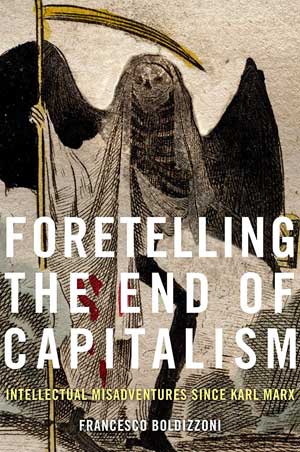
This book seeks to explain the persistence of capitalism despite all the trouble it has created. For several years now, every crisis—even crises not directly caused by capitalism, such as that of Covid-19—has been accompanied by a plethora of recriminations: capitalism is unsustainable, it cannot go on like this. It makes our societies intolerably unequal, fuels racism, destroys the environment, and so on. Everything will have to change. Thus, expectations of structural change arise which, as soon as the crisis is over, are invariably frustrated.
To make sense of why capitalism is still with us, I perform two separate yet related operations. The first is to review unfulfilled prophecies about its end that have been repeated over the past two centuries. Surprisingly enough, they came not only from the left but also from the right. I endeavor to contextualize them historically but also to identify their mistakes. The idea is that from these mistakes something can be learned, certainly about the limitations of our understanding, but more importantly about capitalism itself. Half of the book can therefore be regarded as a work of history, of intellectual history in the broadest sense.
The second operation is to outline a theory of capitalism and the forces that sustain it. Besides what keeps capitalism alive, a good theory should also explain its origin and, possibly, give us some indication as to where it is or isn’t headed. This part of the work, which is more theoretical in nature, culminates in the final chapter, “How Capitalism Survives.”
I wrote Foretelling the End of Capitalism in such a way that it could be accessible to any intelligent reader, regardless of their background. It’s a book deliberately devoid of jargon, where even important concepts are put into a narrative. This isn’t a work of economics, a discipline that—at least in its present form—has little to say about capitalism, but nor does one have to be a sociologist or philosopher to make the most of it. Any person interested in the subject should be able to read this book, be they dentists or kindergarten teachers. Capitalism touches the lives of us all.
Foretelling the End of Capitalism looks back into the past to answer key questions for our time. But this has nothing to do with the uses of the past one often finds in American newspapers these days, namely the search for historical precedents for current problems. This craze for continually comparing situations of the present with situations of the past, which are always the product of unrepeatable circumstances, is good for writing likable op-eds but has little scientific basis.
The way the book uses history is different and this certainly has to do with my biography. I come from an intellectual tradition, that of continental thought, where history is considered to be a social science. The study of the past serves to identify regularities in human behavior but also the principles that govern social change. It helps to explain why human institutions are time- and place-specific, but at the same time why they change only very slowly and resist attempts to destabilize them.
If I were to think of the authors and currents that have influenced me the most over the years, these would definitely include classics of social theory such as Karl Marx, Emile Durkheim, and Max Weber. They created categories that are still indispensable for understanding the world we live in. Equally important would be the later French and German historical scholarship, with its emphasis on structures rather than events, and cultural anthropology, which offers the tools for decoding the grammar of societies. Finally, I drew important methodological lessons from hermeneutics, a non-naïve approach to “truth,” and from Frankfurt’s critical theory, a powerful antidote against irrational faith in progress.
While my book unquestionably bears the signs of all these influences, it’s also the result of more practical concerns. In fact, during the past decade my research and teaching interests have increasingly focused on the relationship between politics and the economy, and on how the former intervenes in human societies to regulate the latter. Capitalism is the terrain on which this relationship is most conflictual and where more extensive forms of regulation are needed.
The first part of the book tells a story of disappointments with our ability to forecast the future of capitalism. This story unfolds in several stages: the Victorian era (Chapter 1), the interwar period (Chapter 2), and the postwar period until the early 1980s (Chapter 3). In the camp of the anticapitalist left, one comes across the betrayed hopes of many old acquaintances, from Karl Marx to Herbert Marcuse. In the conservative and liberal camp, on the other hand, examples range from Friedrich Hayek’s phobia of socialism to Daniel Bell’s moralistic anxieties about the affluent society. In between, one makes more unexpected encounters such as those with John Stuart Mill and John Maynard Keynes.
Chapter 4 continues with an analysis of what has gone wrong with our thinking about the economy and society since the 1990s, a section that could perhaps be of special interest to those who are looking for the roots of the troubled political times we are in. It challenges a number of myths: the myth of the “end of history” and the triumph of the liberal order; the myth that the postindustrial age would erase class conflict and turn workers into high-tech capitalists; the myth that the notions of “left” and “right” have lost their meaning, and so on. The book went to press too early for me to be able to cover the expectations of radical change triggered by the 2020 pandemic, but ample space is devoted to the hopes of seeing capitalism overthrown that followed the global financial crisis at the turn of the 2010s.
To those impatient to reach the book’s conclusions, however, I would suggest focusing on the last two chapters. Chapter 5, a rather disenchanted reflection on the legacy of the Enlightenment, contains the key to all previous chapters. Chapter 6, which I mentioned earlier, seeks on the other hand to answer the questions of what capitalism is, what keeps it alive, and to what extent it can be overcome.
Umberto Eco has shown us that a book can have different implications to different readers, often beyond the author’s intentions. This is perhaps inevitable, but I would nevertheless like to take this opportunity to say two or three things about the spirit in which I wrote it and what I think are the main points to take home.
First of all, this is a book written from the left and to remind the left of its responsibilities. There is not the slightest complacency on my part in narrating the misadventures of thinkers who hoped for a world liberated from capitalism and exploitation—a world in which human beings could be truly free—if anything, there is pain. I sometimes receive interview requests from conservative media eager to use the book’s conclusions to back reactionary agendas. Those looking in it for evidence to legitimize the status quo have taken the wrong direction.
My main point is that capitalism has survived so many predictions of its demise not because it is a particularly efficient system, nor because of some magical virtues of the markets, as the cliché would have it, but because it is rooted in the hierarchical and individualistic structure of modern Western societies. These elements—hierarchies and individualism—have taken shape over many centuries and cannot suddenly go away. No matter how much one fights the system, social institutions cannot be ended by acts of will.
The awareness that there are limits to what can be done, but that at the same time the existing order isn’t a fact of nature but a human construction, leads one to abandon both unhelpful feelings of resignation and pointless utopian fantasies and instead take the path of reasonable political change. The political message of the book is, therefore, an invitation to rediscover and practice radical social democracy. Capitalism can be governed by the state and forced to work to the advantage of the many. It is not an easy road, but one that has proved its value in the past and is worth trying again.


Francesco Boldizzoni is Professor of Political Science at the Norwegian University of Science and Technology. He has contributed to several fields across the social sciences, including political theory, political economy, and modern history. In addition to Foretelling the End of Capitalism (Harvard University Press, 2020), which is featured in his Rorotoko interview, he is the author of The Poverty of Clio: Resurrecting Economic History (Princeton University Press, 2011), Means and Ends: The Idea of Capital in the West, 1500-1970 (Macmillan, 2008), and over two dozen of articles and book chapters.